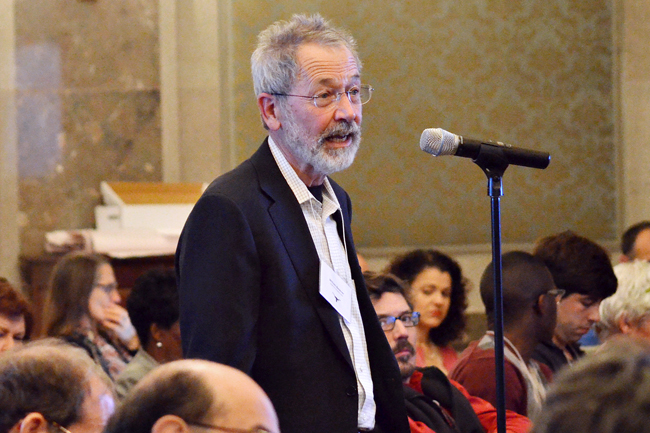As the Senate of College Councilshttp://utsenate.org/ president, I’ve written for the Texan on a number of University-related issues, the majority of which the organization I represent had taken a stance on.
Today, however, I am writing about an issue, Shared Services, which Senate has not yet spoken on, and, consequently, these thoughts are only my own and not those of Senate.
Shared Services came about as a part of the Report on Business Productivity, in which business leaders examined the operations of UT to determine areas where the campus could optimize efficiency. Although there has been a robust dialogue on this project so far, it feels at times like only the side of the detractors is being told.
There are a few recent examples of this one-sidedness. First, a January Faculty Council meeting where some faculty members inserted politically charged language into an otherwise well-intentioned resolution questioning Shared Services. Second, a Feb. 7 protest orchestrated by the Texas State Employees Union and the UT Save Our Community Coalition condemning the University. Finally, there was even a recent tongue-in-cheek denunciation of McCombs School of Business Dean Tom Gilligan’s position on Shared Services published in this newspaper. These dramatic reactions create a dialogue that is harmful to the whole process and prohibit a reasoned debate.
One major call from detractors of the proposed plan is that they want to see the data which has led the University to consider Shared Services. Some of these detractors even imply that the University’s inability to produce data immediately means that it has something to hide. This is simply not the truth.
When UT contracted the consulting firm Accenture to work on the Task Force on Business Productivity, the firm was charged with examining UT operations to locate inefficiencies. Using professional expertise and information on UT, they made the determination that the University could save up to $30 million annually by centralizing operations like human resources, payroll, IT and procurement. Vice President and Chief Financial Officer Kevin Hegarty then assembled multiple committees made up of UT staff and faculty to examine the claim and verify its validity. It was determined that the figures were accurate, and so Hegarty spent the better part of the fall semester attending meetings and hosting town hall forums to engage as many people as possible on the project and solicit feedback from the campus. The data people seek is forthcoming, but it will not be here until units such as the College of Liberal Arts and the McCombs School of Business, both of which are part of a pilot Shared Services program designed to see how much the model could actually save, have completed their trial runs of the program. The claim that the campus is jumping into something without adequate information is false. The process has been reasoned, public and cautious.
Admittedly, the involvement of Accenture in Shared Services is a complicated subject, which certainly could have been more transparent. Much has been said about Accenture’s spotty history with the State of Texas, during which several contracts between the state and the company were canceled for their failure to provide the services requested.
The sentiment among detractors of the Shared Services project seems to be that, because Accenture’s services were once inadequate, their efforts at UT are destined to fail. The logic of this argument seems to line up with the old saying about throwing the baby out with the bath water. Just because some of Accenture’s employees may have made mistakes in the past does not mean the entire company is full of people who cannot be trusted to deliver on their contract. With as much as Accenture recruits new hires on our campus, I would guess that many upperclassmen are like me and have friends employed by Accenture. Certainly in my case, their character didn’t change by being attached to the name Accenture.
Shared services is not an uncommon practice; it has been implemented by several other large universities and systems, such as the University of California institutions, Michigan, UNC, Wisconsin, Purdue, NYU and Yale to varying degrees. It has long been a practice in the private sector, too. Why? Because it increases efficiency and thus lowers overall costs. In today’s fiscal climate, every dollar matters. Any improvement that can be made benefits the University and all of its students, faculty and staff. It is absolutely true that losing 500 jobs, as the report calls for, would be a major change to the status quo. However, this reform will be done largely through attrition; the alternative to implementing Shared Services, by keeping the current course, would result in layoffs. And, as Faculty Council Chairwoman Hillary Hart reported at the January meeting, UT is already averaging 250 layoffs annually. In this situation, not only does the University sacrifice efficiency, but people who want to work here are losing their jobs.
What we really need is the return of an informed dialogue on Shared Services, rather than charged rhetoric on data and Accenture. Moreover, this process needs to be driven by those potentially affected by this project: the University’s hardworking staff members. It is disappointing to say the least when a faculty member who disagrees with the idea of Shared Services calls the president of the Staff Council a “lackey” for being open to a pilot program. This is not an environment that encourages reasoned debate on the merits of the University’s plan or lack thereof. Let’s be open to the idea of a pilot program, so that this can be studied further. This is an opportunity today to help shape UT for the future and we should not allow it to be squandered.





















